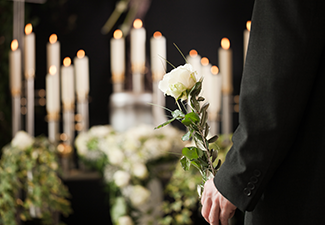FAQs: What Needs to be Done When Someone Dies
Nov. 28, 2022
 When a loved one dies, whether it is expected or not, you want to just have time to grieve. Grief is a process that takes time. However, the reality is that in the wake of the loss, there are so many tasks that need to be done. It seems unfair, but it is the business part of death.
When a loved one dies, whether it is expected or not, you want to just have time to grieve. Grief is a process that takes time. However, the reality is that in the wake of the loss, there are so many tasks that need to be done. It seems unfair, but it is the business part of death.
Your first question will probably be, “What am I supposed to do?” To summarize the answer, “Many things.” James J. Peterson answers some of the many questions here, but there are countless more details. No lives are exactly the same and neither are deaths.
James P. Peterson Attorney at Law has helped answer hundreds of questions for clients from Boerne, New Braunfels, and San Antonio, Texas, over the past 30 years. He is committed to helping them navigate the business of death in the wake of loss. Although what you need will be unique, here are some frequently asked questions and answers about what needs to be done when someone dies.
What is the first thing I should do when a loved one dies?
The first step following a loved one’s death is to obtain an official pronouncement of death. If your loved one died at home, this could come from the hospice provider or the coroner in the event of an accidental or unexpected death. If they died in an accident elsewhere or in a hospital, nursing home, or other care center, a doctor will make the official pronouncement.
If you find someone deceased in your home or theirs, you should call 911 and leave them as they are until help arrives.
Who do I need to notify?
You should begin with notifying immediate family members and close friends. Some of them will often volunteer to contact other members of the family or friends. You can contact most people by phone, but there may be some who should be contacted in person. For example, if your sibling has passed suddenly, you might want to deliver the news to your parents in person, if possible.
If the person had a job at the time of death, notify their employer. The employer will take care of notifying coworkers, so you don’t need to.
You should also contact the Social Security Administration which automatically notifies Medicare. This is important if the decedent was receiving Social Security or Medicare benefits. You should also notify the decedent’s life insurance company.
What about children or pets?
Of course, the welfare and care of children and pets are immediate concerns. If another parent shares custody of a child in the home of the decedent, they will care for the child. If there is no one else with custody, a family member or friend can care for the child while contacting social services.
Pets also need to be taken care of until decisions about their future are made at a later date. You can care for the pet in the decedent’s home if you have access or place the pet in someone else’s care temporarily.
What should I do about their home and documents?
Securing the decedent’s home is important to avoid fraud, identity theft, and break-ins. You should make sure mail and deliveries do not accumulate, pets are taken care of, windows and doors are secured, appliances are off, and temperatures on heating and cooling systems are set appropriately. Make sure any vehicles are locked as well. In the immediate aftermath of someone’s death, their personal possessions belong to their estate.
If you have access to the home, you should check right away for critical documents, such as a life insurance policy, driver’s license, passport, and other identification. Look for lockbox keys and authorizations. Check for estate planning documents such as a will, living will, trust, and documents reflecting their wishes regarding disposition of their remains.
How do I make funeral arrangements?
If the decedent had documentation regarding their final wishes, follow them before making any funeral arrangements. Some people include quite specific instructions as part of their estate plans.
Funerals, burials, cremations, and memorial services must be paid for. Unless you are paying the bills, you will need to determine what resources the decedent had. They might have a pre-paid burial plan or own a cemetery plot. A life insurance policy or trust may be the payment mechanism. Until you know for sure, you will need to wait to make funeral arrangements.
Do I need to get copies of the death certificate?
You will need an official certificate of death to complete nearly every task following the death. It is important that you request several official certificates to use as you need to proffer proof.
If a funeral home is taking care of arrangements, they will often request the number of copies you want for you. Just remember that there is a charge for each copy of the death certificate.
How is the will or trust handled?
If you can locate a copy of the decedent’s will or trust, it will name the person who should handle many of the steps following a death. An executor should be named in the will and a trustee in a trust. These people should be notified as soon as possible.
Do I need to hire an attorney?
As you can see, there are numerous tasks that need to be handled in the wake of a loved one’s death. Not only can it all be overwhelming, but you can also risk running afoul of the law, even if what you do is with the best intentions.
It is a good idea to hire an estate planning attorney right away to get the guidance you need. If you are the executor of the estate as named in the will, or if the probate court appoints you to serve as the personal representative of the estate if there is no will, the job you have in the administration of the estate will be much easier with the help of an experienced Texas probate attorney.
Legal Help When You Need It Most
James P. Peterson Attorney at Law in San Antonio, Texas, has been helping clients get through the steps required in the wake of their loved ones’ deaths for decades. If you have just lost someone close to you, James P. Peterson is here to help give you time and space to grieve. Reach out today.
